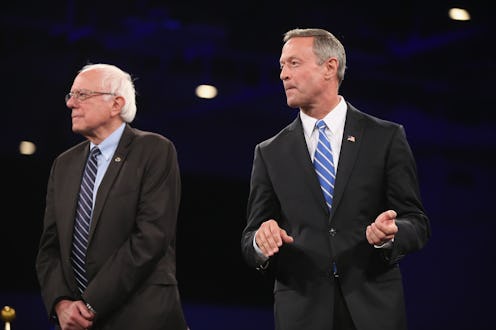News
O'Malley & Sanders Want Debates At Better Times
The third Democratic debate will air on ABC on Saturday night from New Hampshire — the second state to have its say on who will be the party's nominee in 2016. The Democratic candidates participating in the December debate are same three candidates from November: former Secretary of State Hillary Clinton, former Maryland Gov. Martin O'Malley, and Vermont Sen. Bernie Sanders. Two of them, though, would have preferred a weeknight.
The last Democratic debate, also held on a Saturday, only attracted 8.5 million viewers — and the lowest rated debate of this primary season from either party and a far cry from the November Republican debate's 13.5 million. The difference is even starker when you consider that the Dems were on free-to-air CBS and the GOP debate was on Fox Business Network, a relatively new cable channel that only reaches 64 percent of households with television.
After the ratings were released, O'Malley's campaign took the Democratic National Committee to task for its scheduling. "We can't fool ourselves — the Republicans are eating our lunch in terms of attention and viewership because of the unprecedented, unilateral, and arbitrary way the DNC chair determined this schedule," Lis Smith, deputy campaign manager for O'Malley said. The contention over the debate's time slot is only the most recent point of contention over the number of debates.
O'Malley has been pushing the matter since the summer, and Sanders has a petition on his website calling on the DNC to schedule more before the Iowa Caucuses. He first raised the issue in a letter to DNC Chairwoman Debbie Wasserman Schultz in June. Some Democrats have argued the lack of debates was designed to give Clinton an advantage.
Back in November DNC spokesman Eric Walker defended the Saturday night scheduling. "During the height of the Clinton-Obama primary in 2008, the highest-rated debate was 10.7 million, so 8.5 million is a strong showing historically for a presidential primary, and very strong for a Saturday night," Walker said. He added that the Republican debates on network television were scheduled for Saturday night, too.
Since the DNC seems unlikely to blink on the matter, more forums, town halls, and other non-sanctioned debates will be the only way to hear more from the candidates during the primaries. Two were added in November; one hosted by the Democratic parties of 13 southern states and one by MoveOn.org (Clinton did not attend). Only three more DNC debates are scheduled after Saturday: one per month, in January, February, and March, in 2016.
The Democratic candidates won't have a debate on a weeknight until February. Given Clinton's lead, her camp is unlikely to bend unless Sanders gains on her in some of the early states. Meanwhile, tune in Saturday. As it stands, it could be one of the last chances to see all three Democratic contenders on stage.
